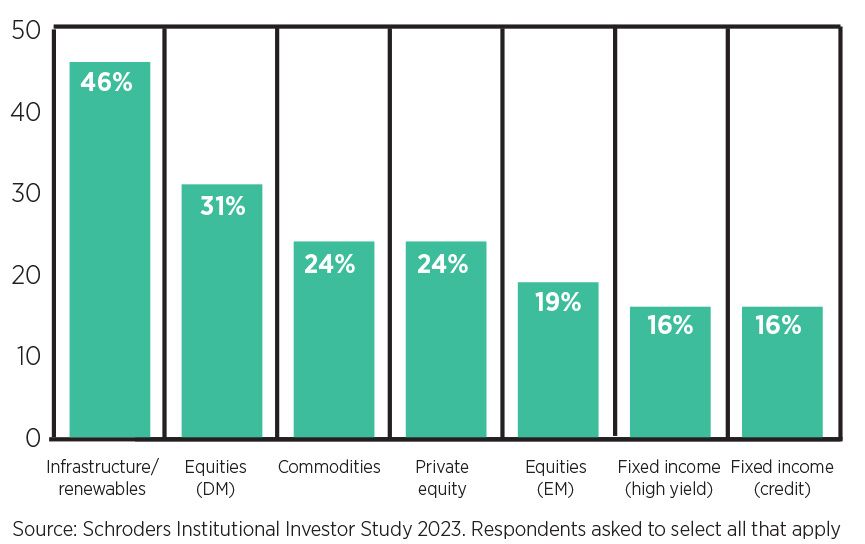Global investors are attempting to harness the investment opportunities provided by the energy transition by expanding into private assets, according to Schroders’ latest Institutional Investor Study.
The annual study, which surveyed 770 investors who hold $34.7trn in assets, identified that decarbonisation, deglobalisation and changing demographics are driving investors to change their portfolio allocations, and, over the next 12 months, more than half of investors expect geopolitical uncertainty and rising inflation to have the greatest impact on portfolio performance.
Over half of respondents, for example, said investors will look towards investing in companies with more localised supply chains, with developed market equities (32%) and private equity (23%) believed to present the best opportunities over the coming years.
“This year’s study shows that investors have grown less certain. Confidence levels have taken a knock from unstable, unpredictable geopolitics and the delicate task facing central banks of cooling inflation without unwanted side-effects,” said Nils Rode, chief investment officer at Schroders Capital.
“Investors are right to exercise caution but should also view this disruptive environment not as merely a temporary phase but the emergence of a new era altogether. What is clear from the study results is that many investors continue to be drawn to private assets to engage with the evolving macroeconomic landscape, as well as to add resilience to portfolios.”
Around half of global investors said that infrastructure and renewables are best placed to capture the investment opportunities presented by decarbonisations trends in the medium-term. With this asset class poised to benefit from the green technology revolution, 41% noted that they expect to increase allocations to infrastructure over the next 12 months.

More broadly, over half of respondents said that they are seeking to proactively harness the investment opportunities presented by the energy transition and related technological revolution through greater exposure to private assets. Similarly, when asked why they would consider investing in sustainability and impact strategies, two-thirds of respondents expressed an appetite for investing in new sectors such as nature-based solutions and green hydrogen to achieve portfolio diversification and expand into new themes and asset classes.
“Private equity, private lending and real assets – both infrastructure and real estate – were the areas investors said they were most likely to add to in the coming year and beyond,” continued Rode.
“Thematically, investors are aware that private assets are plugged directly into the durable trends of disruption and progress that will be catalysed by rapid improvements in AI tech, the ongoing energy transition and decarbonisation, as well as demographic change. We believe these trends are central to identifying opportunities for value creation in the new environment, and we are prioritising strategies aligned with these themes, with low correlations to stock markets, limited or no dependence on leverage and multiple avenues for exit.”
However, the study suggests that support is needed to help investors with impact investing, with measurement being a key challenge. Three-fifths of investors (60%) believe having an impact which is easily measured and understood to be the most important criteria when considering an allocation to impact-focused investments. Furthermore, over half of respondents identified a lack of standardisation in terms of measurement, process, tools and metrics to be the biggest obstacle for investing in private assets strategies focused on sustainable investing.
Additionally, about half of respondents think their organisation needs help in measuring and tracking their net zero path, up to 51% from 37% last year. Results showed that 49% of investors believe that a greater consensus is also required around the respective frameworks and methodologies which measure net zero pathways for them to achieve their commitments.





